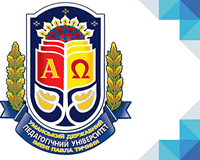Будь ласка, використовуйте цей ідентифікатор, щоб цитувати або посилатися на цей матеріал:
https://dspace.udpu.edu.ua/handle/123456789/14737| Назва: | STRUCTURAL COMPONENTS OF THE MODEL OF PREPARATION OF A MODERN PRIMARY SCHOOL TEACHER FOR THE FORMATION OF LOGICAL SKILLS IN STUDENTS |
| Інші назви: | СТРУКТУРНІ КОМПОНЕНТИ МОДЕЛІ ПІДГОТОВКИ СУЧАСНОГО ВЧИТЕЛЯ ПОЧАТКОВОЇ ШКОЛИ ДО ФОРМУВАННЯ ЛОГІЧНИХ УМІНЬ В УЧНІВ |
| Автори: | Ящук, Олена Миколаївна |
| Ключові слова: | початкова школа молодші школярі підготовка вчителя модель професійної підготовки структурні компоненти формування логічних умінь логіка критерії |
| Дата публікації: | 27-лип-2020 |
| Видавництво: | Видавничий дім "Гельветика" |
| Бібліографічний опис: | Olena YASHCHUK. STRUCTURAL COMPONENTS OF THE MODEL OF PREPARATION OF A MODERN PRIMARY SCHOOL TEACHER FOR THE FORMATION OF LOGICAL SKILLS IN STUDENTS / Актуальні питання гуманітарних наук: міжвузівський збірник наукових праць молодих вчених Дрогобицького державного педагогічного університету імені Івана Франка / [редактори-упорядники М.Пантюк, А. Душний, І. Зимомря]. - Дрогобич: Видавничий дім "Гельвестика", 2020. Вип. 28. Том 4. С.300-305 |
| Серія/номер: | УДК;378.018.8.373.3.011.3-051 |
| Короткий огляд (реферат): | Changes in the content and conceptual framework of primary education cause a social need to train a new generation of teachers. Modeling process is an important method and means of scientific knowledge and improvement of the process of future teachers’ professional training. In pedagogical science, modeling is used to solve a number of problems, the main ones are the following: optimizing the structure of teaching material; improving the planning of the educational process; cognitive activity managing; managing the educational process; diagnostics, forecasting, and designing of training.The use of the modeling method in our study is intended to define priority directions of logical skills formation in primary school pupils; to ensure the consistency and integrity of the training process to their formation at pedagogical higher education institutions; to manage the process of professional training of future primary school teachers to the formation of junior pupils logical skills. In the conceptual construction of the pedagogical model, we were guided by the works of such outstanding scientists, as M. Bakhtin, V. Bespalko, V. Bibler, A.Burov, N. Kagan, N. Kyiashchenko, N. Leyzerov, E. Romanov, S. Rubinstein, B. Teplov, L. Vygotsky and others. The main idea in modeling the process of readiness of future primary school teachers to form the logical skills of junior pupils is to develop a model that would improve the effectiveness of this process and bring it in line with the requirements of modern society. In our research the object of the model of future primary school teachers’ professional training to the formation of primary school pupils’ logical skills is the context of pedagogical activity of future primary school teachers in the process of studying psychological and pedagogical subjects, teaching methodologies, mathematics and logic, as well as practice.The results of the analysis of theoretical sources on the problem of future teachers’ professional training allowed to develop a structural and meaningful model of future primary school teachers’ professional training to form logical skills of primary school pupils. The structural components of the model developed by us are the following: target (social order, goal, tasks); methodological (approaches, principles, subjects of interaction); content and activity (content, forms, tools, methods, technologies); evaluative and resultative (criteria, indicators, levels, result).All elements of the model of future primary school teachers’ training to form logical skills of primary school pupils are interconnected and mutually conditioned, which is confirmed by its integrity and consistency. |
| Опис: | http://journals.uran.ua/index.php/2308-4855/article/view/208855 |
| URI (Уніфікований ідентифікатор ресурсу): | https://dspace.udpu.edu.ua/handle/123456789/14737 |
| Розташовується у зібраннях: | Факультет початкової освіти |
Файли цього матеріалу:
| Файл | Опис | Розмір | Формат | |
|---|---|---|---|---|
| STRUCTURAL COMPONENTS OF THE MODEL OF PREPARATION OF A MODERN PRIMARY SCHOOL TEACHER FOR THE FORMATION OF LOGICAL SKILLS IN STUDENTS.pdf | 15,43 MB | Adobe PDF | Переглянути/Відкрити |
Усі матеріали в архіві електронних ресурсів захищені авторським правом, всі права збережені.

